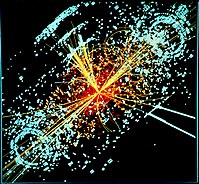
Photo from wikipedia
It has been suggested that dark matter is a superfluid of particles whose masses are on the rough order of $10^{-22}$ eV. Since the occupation numbers are huge, the state… Click to show full abstract
It has been suggested that dark matter is a superfluid of particles whose masses are on the rough order of $10^{-22}$ eV. Since the occupation numbers are huge, the state is coherent, and the speeds typical of orbital velocities in halos, it has generally been assumed that a classical effective non-relativistic treatment is adequate. However, the Compton wavelength would be $\sim 1\, {\rm pc}$, and around the Compton scale concerns about some aspects of quantum measurement theory, known in principle but not quantitatively significant in previous cases, become pronounced. I estimate here the stress--energy operator, averaged over a few Compton wavelengths; a rough but useful approximation has a remarkably simple form. Conventional quantum measurement theory gives physically unacceptable results: a thought-experiment to measure the stress--energy is described which would involve only a modest apparatus but would excite particles in the observation volume to relativistic energies; these particles would escape the Galaxy, and there would be a substantial violation of energy conservation. Related foundational questions come up: the meaning of measurements of observables with continuous spectra, and the problem of predicting when measurements occur. The effective classical theory of fuzzy dark matter is not affected; however, the underlying quantum theory cannot be regarded as satisfactory without resolving these issues. But we may interpret the results more broadly. The macroscopic Compton scale amplifies inadequacies of measurement theory which have not previously seemed pressing.
Journal Title: Physical Review D
Year Published: 2018
Link to full text (if available)
Share on Social Media: Sign Up to like & get
recommendations!